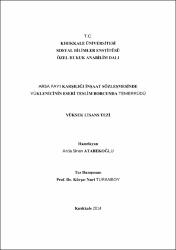| dc.contributor.advisor | Turanboy, Kürşat Nuri | |
| dc.contributor.author | Atabekoğlu, Arda Sinan | |
| dc.date.accessioned | 2021-01-16T18:55:00Z | |
| dc.date.available | 2021-01-16T18:55:00Z | |
| dc.date.issued | 2014 | |
| dc.identifier.uri | | |
| dc.identifier.uri | https://hdl.handle.net/20.500.12587/14402 | |
| dc.description | YÖK Tez ID: 419140 | en_US |
| dc.description.abstract | Arsa payı karşılığı inşaat sözleşmeleri taraflar arasında ani edimli bir borç ilişkisi doğurur ve yüklenicinin asli edim borcu, inşaatın tamamlanıp iş / arsa sahibine teslim edilmek suretiyle tek seferde yerine getirilir. Eserin meydana getirilme aşaması ise edim borcunun ifasına yönelik zamana yayılan bir iş görme fiili niteliğindedir. Ancak bu durum, ifanın, inşaatın meydana getirildiği her bir anda gerçekleşmekte olduğunu göstermez. Bu anlamda ifanın eser tamamlandıktan sonra bir defada gerçekleşmesi durumu çelişki arz etmeyip genel manada eser sözleşmelerinin doğası gereğidir. Zira iş / arsa sahibi sözleşme ile ortaya çıkmasını arzuladığı yegane amaca bu son fiil ile kavuşur. Bu noktanın şüpheye yer vermeyecek şekilde belirlenmesi inceleme konumuz olan sözleşme dolayısıyla ortaya çıkacak uyuşmazlıkların çözümünde baş rol oynamaktadır. Özellikle, inşaatın yüklenicinin teslim borcuna aykırı davranışı ve bu çerçevede temerrüde düşmesi halinde iş sahibi açısından kullanılabilecek hukuki yolların belirlenmesi bu konu ile doğrudan ilgilidir. Yüklenicinin temerrüde düşmesi üzerine, iş / arsa sahibi Türk Borçlar Kanunu'nun genel hükümlerinde düzenlenmiş bulunan borçlu temerrüdü durumunda alacaklıya tanınan seçimlik imkanlardan yararlanabilir ve bu çerçevede sözleşmeden dönebilir. Bu sonuca varılması ile birlikte sözleşmeden dönmenin mümkün olmayacağını savunan görüş de çalışmada ayrıntılarıyla açıklanmış ve Yargıtay uygulaması da tarihsel süreç içerisinde değişim gösteren içtihatlar belirtilmek suretiyle irdelenmiştir. Sözleşmeden dönme yolunun mümkün olduğunun kabul edilmesi halinde ise bu çalışmada üzerinde durulan ikinci temel problemin çözümü zarureti doğar. Bu, dönmenin taraflar arasındaki sözleşmesel ilişkiye ne şekilde tesir edeceğidir. Medeni Kanun hükümleri uyarınca sebebe bağlı (illî) olduğu tartışmasız olan taşınmaz mülkiyetini devir borcu doğuran sözleşmeler ile sözleşmeden dönme müessesesine teoride verilen anlamların birlikte değerlendirilmesi sonucunda dönmenin ayni bir etki doğurduğu görüşü benimsenmiştir. Doktrinde bu görüş haricinde benimsenen diğer görüşler ile Yargıtay uygulaması çalışmada yer bulmuş ve sözleşmeden dönme üzerine ortaya çıkabilecek potansiyel durumlar karşılaştırmalı olarak incelenmiştir. Anahtar Sözcükler: 1. Arsa Payı; 2. İnşaat Sözleşmesi; 3. Yüklenici; 4. Teslim Borcu; 5. Temerrüt | en_US |
| dc.description.abstract | Construction contracts for land share which are made between parties lead to a debt relationship with immediate performance and performance debt of the contractor is fully paid once by means of completing the construction and delivering it to the employer / land owner. The procedure of creating the work is an act of performance over a time in order to pay the performance debt. However, this condition does not mean that the debt is being paid every moment in which the construction is done. In this context, making payment fully once the work is fully completed is not contradictory but in general it is because of the nature of work contracts. The employer / land owner has the work that is the only purpose of the work agreement, only at the end of this completed work. Clearing this point so that it does not cause any doubts plays an important role for the resolution for the disputes that may originate from this agreement, which is the subject of this study. Especially specifying the legal ways to be fallowed when the contractor violates the delivery terms and conditions or falls into default is directly related with this issue. When the contractor falls into default, the employer / land owner can make a choice between the choices provided for the employer / land owner in the general provisions the Turkish Code of Obligations regarding contractor's falls into default and can cancel the contract. Having this result, prospect which advocates that it is not possible to cancel the contract thereafter is also explained in this contract as well as applications of Supreme Court of Appeals, giving the by-laws which have become different from time to time in the historical process. On the condition that it is accepted that it is possible to cancel the contract, then, the second main issue in this study is needed to be dissolved. This depends on how much the cancel of the contract will have impact on the contractual relationship between the parties. The prospect which advocates that cancelling the contract has a real impact has been adopted as a result of making an assessment on the agreements which lead to debt upon the transfer of the real property, which indisputably depends on reasons, in accordance with the provisions of Civil Code and the meanings attributed to cancelling the contract in theory. The prospects which are adopted in the doctrine apart from this one and the potential conditions which are included in the study on applications of Supreme Court of Appeals, which may come into being upon cancelling the contract, are studied in comparison. Key Words: 1. Land Share; 2. Construction Contract; 3. Contractor; 4. Debt to Deliver; 5. Default | en_US |
| dc.language.iso | tur | en_US |
| dc.publisher | Kırıkkale Üniversitesi | en_US |
| dc.rights | info:eu-repo/semantics/openAccess | en_US |
| dc.subject | Hukuk | en_US |
| dc.subject | Law | en_US |
| dc.title | Arsa payı karşılığı inşaat sözleşmesinde yüklenicinin eseri teslim borcunda temerrüdü | en_US |
| dc.title.alternative | Contractor's falling in to default about delivering the completed work in construction contract for land share | en_US |
| dc.type | masterThesis | en_US |
| dc.contributor.department | KKÜ, Sosyal Bilimler Enstitüsü, Özel Hukuk Anabilim Dalı | en_US |
| dc.identifier.startpage | 1 | en_US |
| dc.identifier.endpage | 271 | en_US |
| dc.relation.publicationcategory | Tez | en_US |
















